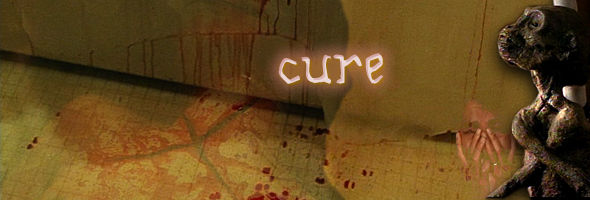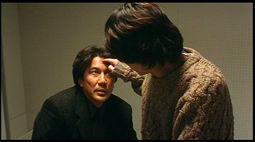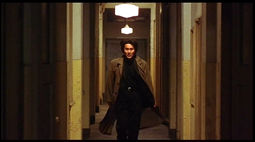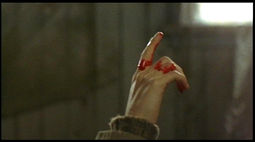
Color, 1997, 115m. / Directed by Kiyoshi Kurosawa / Starring Koji Yakusho, Masato Hagiwara / Home Vision (US R1 NTSC), Daiei (Japan R2 NTSC) / WS (1.85:1) (16:9) / DD2.0
A young woman is found dead, with a bloody "X" carved in her throat, while the culprit huddles in terror inside a cabinet. The detective assigned to the case, Takabe (Koji Yakusho), is alarmed when more murders occur, each with a similar carved symbol. The amnesiac killer in one case, Mamiya (Masato Hagiwara), is brought into custody after attempting suicide and soon triggers disturbing theory: hypnosis as murder weapon. Takabe attempts to unlock the young madman's mind but soon finds his own psyche at risk, while his mentally fragile wife (Anna Nakagawa) proves to be little comfort.
Nakagawa's opening recitation of the familiar Bluebeard fairy tale immediately establishes Kurosawa's primary concern with the film, that "one flaw" in a human being which opens the gates to madness. Exactly how that flaw is exploited, turning an everyman into a murderer, is the tantalizing enigma left open at the end of the film, whose chain of violence remains a horrific puzzle with pieces still left scattered on the table. The excellent leads and atmospheric photography go a long way to carrying the film through, which is fortunate given that narrative cohesion doesn't seem to be one of Kurosawa's strong points (or, as he admits on this disc, even one of his major concerns). The film dreamily floats from one unnerving set piece to another without much in the way of a natural story progression; while Italian directors compensate by amping up the cinematic style to an operatic degree, Kurosawa takes the opposite approach by paring all of his elements down to a creepy whisper. Whether the slow pacing and
Though the director remains curiously underrepresented on international video, Home Vision has done a slick job of presenting Cure in an attractive, darkly burnished transfer which bests the attractive but overly bright Japanese DVD. Surround audio is spare but sometimes highly effective, with ambient white noise often grumbling during even the quietest scenes to amp up the feeling of unease. Extras include the American theatrical trailer, a filmography, appreciative liner notes by midnighteye's Tom Mes, and a 20-minute interview with director Kiyoshi Kurosawa who talks about his fascination with the horror genre and his interest in cinematic form as a means unto itself, a skill he has obviously perfected by now.
Lifting its basic premise from such "ordinary people doing horrible things" horror films as God Told Me To and Fallen, then stripping away any semblance of religious pretense, Kiyoshi Kurosawa's Cure (Kyua) marked
 the director's foray into the designer serial killer subgenre forged in the 1990s. Known for bringing a reserved, icy cold precision to such genre staples as technological doomsday yarns (Pulse), haunted houses (Sweet Home), psychics (Seance), and even supernatural trees (Charisma), Kurosawa enjoyed his widest international exposure with this stylish but only sporadically effective shocker, which kicks off with an appropriately sinister first act but only occasionally recaptures its mood before a fascinating but somewhat frustrating finale.
the director's foray into the designer serial killer subgenre forged in the 1990s. Known for bringing a reserved, icy cold precision to such genre staples as technological doomsday yarns (Pulse), haunted houses (Sweet Home), psychics (Seance), and even supernatural trees (Charisma), Kurosawa enjoyed his widest international exposure with this stylish but only sporadically effective shocker, which kicks off with an appropriately sinister first act but only occasionally recaptures its mood before a fascinating but somewhat frustrating finale.

 subdued chills work entirely is a judgment that will depend more on the viewer, as his films tend to evoke widely disparate reactions; at the very least, curious parties interesting in seeking out Japanese horror beyond Ringu owe themselves a look at Kurosawa's work, and this or Pulse would be the ideal place to start.
subdued chills work entirely is a judgment that will depend more on the viewer, as his films tend to evoke widely disparate reactions; at the very least, curious parties interesting in seeking out Japanese horror beyond Ringu owe themselves a look at Kurosawa's work, and this or Pulse would be the ideal place to start.
